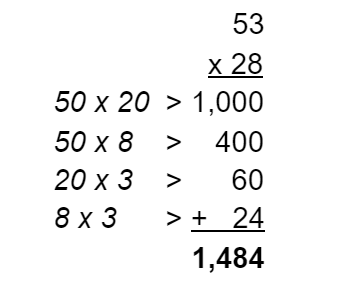8 x (6 - 6) =
8 x (6 - 6) = 0
Mr. Corrigan has $12 to buy as many packs of pencils as he can for class. 1 pack of pencils costs $2.69.
How many packs can he buy?
He can buy 4 packs of pencils with $12
What two partial products would you add together to multiply 26 x 6 = 156
You would add the partial products 120 + 36.
20 x 6 = 120
6 x 6 = 36
Which is the larger number?
2/3 or 4/5
2/3 < 4/5
How many factors does the number 6 have and what are they?
6 has four factors
1, 2, 3, 6
(6 x 5) - 4 = 26
Mr. Corrigan has $12 to buy as many packs of pencils as he can for class. 1 pack of pencils costs $2.69.
About how much will he spend on 4 packs?
Mr. Corrigan will spend about $10.00 or $11.00
$2.50 x 4 = $10
$2.75 x 4 = $11
What three partial products would you add together to multiply 348 x 4 = 1,392
You would add the partial products 1,200 + 160 + 32.
300 x 4 = 1,200
40 x 4 = 160
8 x 4 = 32
True or False.
4/12 = 1/4
4/12 = 1/4 is False
4/12 = 1/3
How many factors does the number 12 have and what are they?
12 has six factors
1, 2, 3, 4, 6, 12
9 + (7 x 8) =
9 + (7 x 8) = 65
Mr. C bought 6 packages of art paper. Each package had 120 sheets of paper in it. How many sheets of paper did he buy?
Mr. C bought 720 sheets of paper.
120 x 6 = 720
(100 x 6) + (20 x 6) = 720
What two partial products would you add together to multiply 32 x 40 =1,280
You would add the partial products 1,200 + 80.
30 x 40 = 1,200
2 x 40 = 80
Which fraction doesn't belong?
1/2, 5/10, 6/12, 3/6, 4/10, 2/4
4/10 doesn't belong. All the other fractions are equivalent to 1/2. (1/2, 5/10, 6/12, 3/6, 2/4)
Name three different numbers that have only 2 factors. (Also known as prime numbers)
1, 2, 3, 5, 7, 11, 13, 17, 19.....
(6 + 4) x 8 =
(6 + 4) x 8 = 80
$69 is shared equally by 5 friends.
a. How many $10 bills does each friend get?
b. How many $1 bills does each friend get?
a. Each friends gets one $10 bill.
b. Each friends gets three $1 bills.
What four partial products would you add together to multiply 48 x 35 = 1,680
You would add the partial products 1,200 + 200 + 240 + 40
40 x 30 = 1,200
40 x 5 = 200
30 x 8 = 240
8 x 5 = 40
What is the smallest and largest fraction in this group?
4/5, 2/5, 0/12, 3/7, 9/10, 2/3
0/12 is the smallest fraction
9/10 is the largest fraction
Which of these numbers is 6 not a factor for?
24, 48, 12, 18, 28, 36, 20, 42
28 and 20 are not factors of 6.
(3 x 5) + (9 x 6) =
(3 x 5) + (9 x 6) = 69
$69 is shared equally by 5 friends.
How much does each friend get?
$13.80 for each friend.
$10 + $3 + $0.80
Multiply using partial products. What is the product and what are the four partial products you add?
53 x 28 = ?
53 x 28 = 1,484

Put the fractions in order from smallest to largest.
8/8, 2/3, 6/7, 3/12, 0/2
0/2, 3/12, 2/3, 6/7, 8/8
Which number has more factors and how many factors does each number have? 30 or 32
Thirty has more factors (8) than thirty two (6).
30 = 1, 2, 3, 5, 6, 10, 15, 30
32 = 1, 2, 4, 8, 16, 32